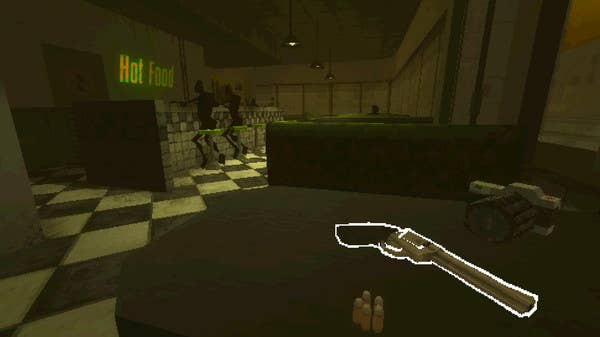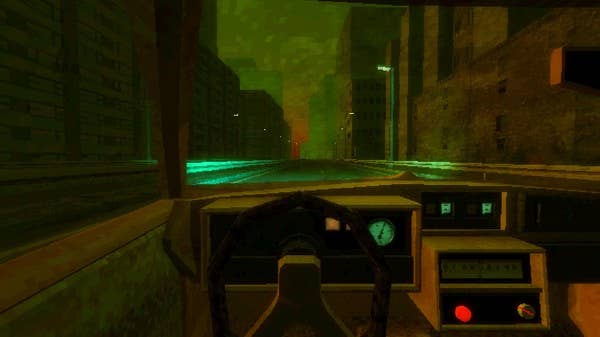Paratopic haunts the walking sim with verbs and violence
Co-creator and writer Doc Burford describes the IGF-nominated game's conception as a mischievous play on expectations for the genre
Paratopic is a game about a smuggler, an assassin, and a bird watcher, asynchronously connected across events at an apartment complex, a convenience store, a diner, and a forest, by a set of video tapes that contain a secret with the potential to break the mind of the person who watches them.
After playing through the IGF-nominated indie twice, that's about the best plot summary I can compile of a game that seems determined to disorient its audience at every turn. Paratopic's co-creator and writer, Doc Burford, is fully aware that his game presents an effectively unsolvable mystery, but the fact that it leaves lingering, nagging questions with its audience is exactly what he wanted.
"So many people have replied to Paratopic with, 'It sticks with you,'" he told me. "I wanted a game that got in your head."
"I wanted a game that got in your head"
Paratopic's conception, like the seemingly disconnected yet ultimately linked world of the game itself, came from a variety of inspirations and ideas Burford had over the course of several years. He told me that he and artist Jess Harvey effectively made Paratopic "so we can make rent", but the game's story and aesthetic had been percolating in Burford's mind for some time before the decision to put a short game together with their limited resources was made.
In one part, Paratopic was Burford's response to the walking sim genre.

"I played Dear Esther, and I thought it was really interesting but also very boring. You walk through an environment, you're told a story, and that didn't seem super interesting to me. But it was interesting as an artefact, even if it wasn't interesting as an experience. I think it made its entire budget back in a couple of hours [less than six, to be exact], so it did really, really well. That convinced a lot of people that this is the future of storytelling or something.
"So a bunch of games come out, and they do kind of the same thing, and I was over time becoming increasingly critical of the form. I sat down and thought, 'How would I make a walking sim? What is my brand, and how would that differ from everyone else?'"
The question of what Burford's "brand" is turned out not to be too difficult to answer, and ultimately provided another piece of inspiration for what would eventually be Paratopic. If you follow him for any amount of time on Twitter, you'll quickly notice a wealth of opinions on a classic video game staple: guns.

"I'm the guy who tweets all the time things like, 'Hey indie developers, the secret to making a good game is to add a gun,'" he said. "And it's not really because I think that's true. It's more because there are a lot of people out there offering advice for how to make games. And they're saying, 'If you do this simple thing, your game will be successful.' So I thought it would be funny to mock that by looking at the one thing a lot of people argue against.
"But every single E3, you have critics who say, 'There were 25 violent games onstage and ten non-violent games.' And I love non-violent games, but I don't like having a lot of people telling me this kind of avenue is exclusively bad, don't do it. There's a part of me that's cheeky, that finds it funny to push back against it."
"Every single E3, you have critics who say, 'There were 25 violent games onstage and 10 non-violent games'"
Paratopic certainly pushes back, with multiple instances of violence particularly memorable due to the game's unsettling PS1-style graphics, but Burford didn't set out to just make a non-stop violence-fest, either. He said that the moments of violence in Paratopic were extremely deliberate, and intended to sit in contrast to the game's more peaceful scenes, such as its multiple driving sequences and quiet bird-watching treks through a forest.
"I like the juxtaposition of violence and non-violence," Burford said. "What makes a gun interesting in movies is someone pulls out a gun, or I have a gun at my hip and the gun becomes an object of danger, it becomes a focal point. When you have that moment [in Paratopic] when you're loading bullet by bullet into your gun, it feels way more meaningful than a video game where everyone you run across is dropping guns.
"I love Call of Duty, but there are hundreds of guns on the ground you can just pick up and start shooting, and when you're out of bullets you can just go get another gun, but you're never out of bullets because there are so many guns. I want to have a gun be a singular thing. I want a gun that you look at, it becomes a object of terror, and then I give it to you because I want you to be the one who's afraid.

"I was thinking of Call of Cthulhu: Dark Corners of the Earth, a game that literally tells you, 'I know I just gave you a gun, but if you shoot it, a bunch of monsters are going to attack you and you'll die.' You're holding a hot potato. That made it really interesting to me."
"I want a gun that you look at, and it becomes a object of terror"
The mischievous combination of violence with the more traditional, peaceful elements of the walking sim genre is certainly a major element in Paratopic's strange story, but your activities in the game aren't limited to "walking around" and "doing violence." Burford said that a third key idea that led to what became Paratopic was what he saw as a need for more "verbs" in walking sims and video games in general -- something other than simply walking, talking, and shooting.
"I know people are saying the walking sim is great, but I think a lot of those people care about content and they don't care about the experience of playing the game...and the critics of the genre were saying, 'It has no gameplay, so it's not really a game.' Now, 'It's not really a game' is a stupid idea, because the thing exists. And there are good walking sims. But I think we can do more, and I think what we need is verbs."
Before Paratopic, Burford was working on another game in his spare time. The concept was for a series of vignettes exploring different verbs as game mechanics, such as first-person eating, shaving, and driving.
Though Burford said he never found a way to make that game interesting, some of the ideas for verbs were recycled into Paratopic. There's the aforementioned driving sequence, simply waiting for an elevator, taking photos in the woods, an update to the game that added squirting ketchup bottles, and of course, shooting a gun.
Those only represent a handful of the verbs the team considered, and Paratopic itself wasn't intended to end permanently on its unsettling final line. Currently, Harvey is committed to other projects and Burford is pursuing more long-term work, but the door remains open for the game's strange cast to return. Burford envisions the game as episode one of a longer story, where future instalments give him room to explore other verbs. Of course, he intends to continue to juxtapose the more benign actions with violent ones in keeping with the game's mischievous inspirations.
"The most important part of the entire design philosophy, other than being mischievous, was that we can take moments in time and make each one of those moments interesting even if they're not traditional gameplay moments."








